Importance of Managing Crisis in the Hospitality Sector: Research
VerifiedAdded on 2023/06/12
|21
|5703
|281
Report
AI Summary
This research report investigates the importance of crisis management within the UK hospitality sector. It begins by defining crisis management and its relevance to hospitality, highlighting the potential for both internal and external crises to negatively impact operations. The report outlines the rationale for studying this topic, emphasizing the need to prevent reputational damage and business losses. Research objectives include understanding the concept of crisis management, identifying its importance, determining current practices, and assessing its role within the sector. The literature review explores various types of crises, such as natural disasters, technological failures, and employee disputes, and emphasizes the importance of crisis management for ensuring safety, maintaining reputation, and restoring stability. Effective crisis management practices include developing emergency response plans, conducting vulnerability analyses, creating dedicated solutions teams, and keeping employees informed. The report also touches upon research methodology, including research philosophy and approach, and concludes with data analysis and recommendations. Desklib offers a variety of study tools and solved assignments for students.
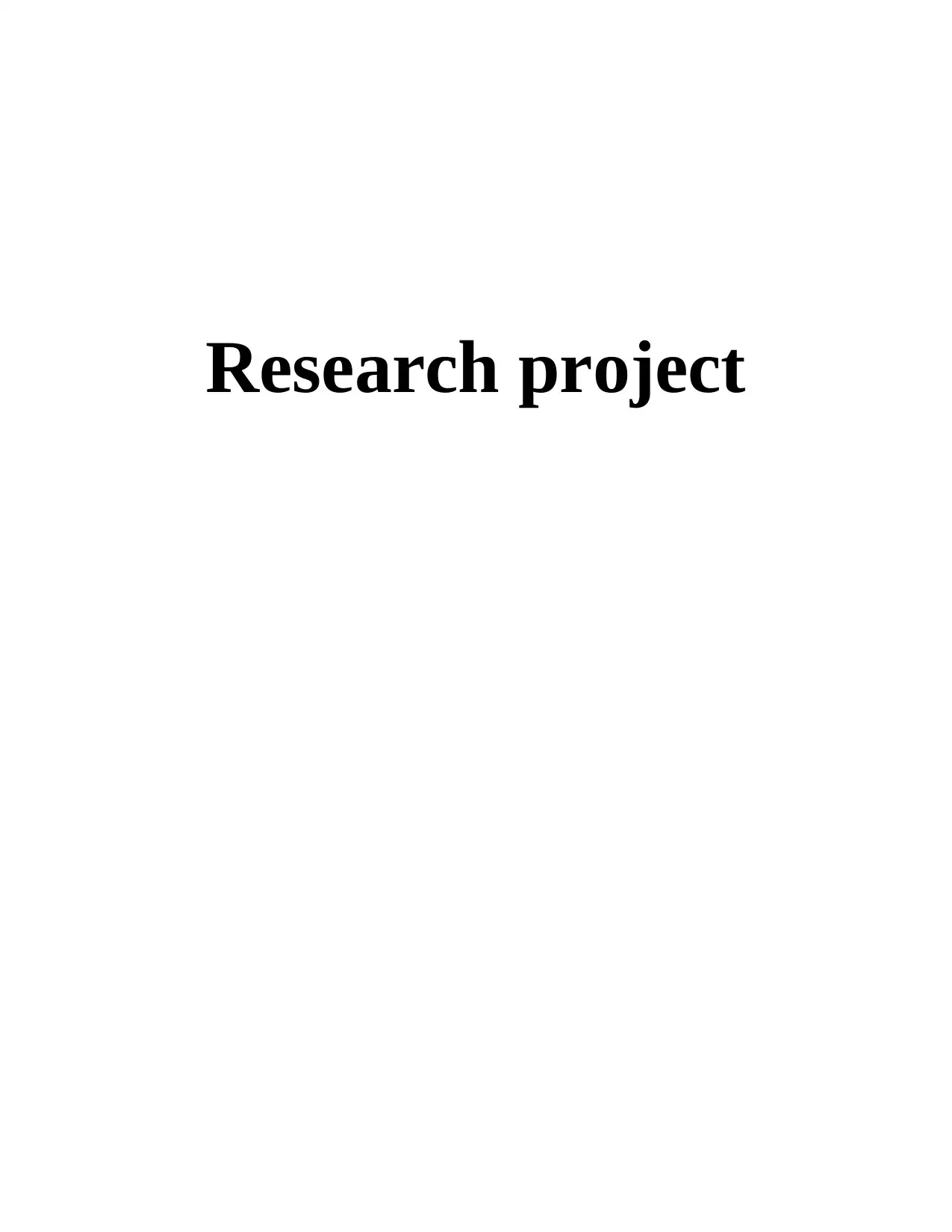
Research project
Paraphrase This Document
Need a fresh take? Get an instant paraphrase of this document with our AI Paraphraser
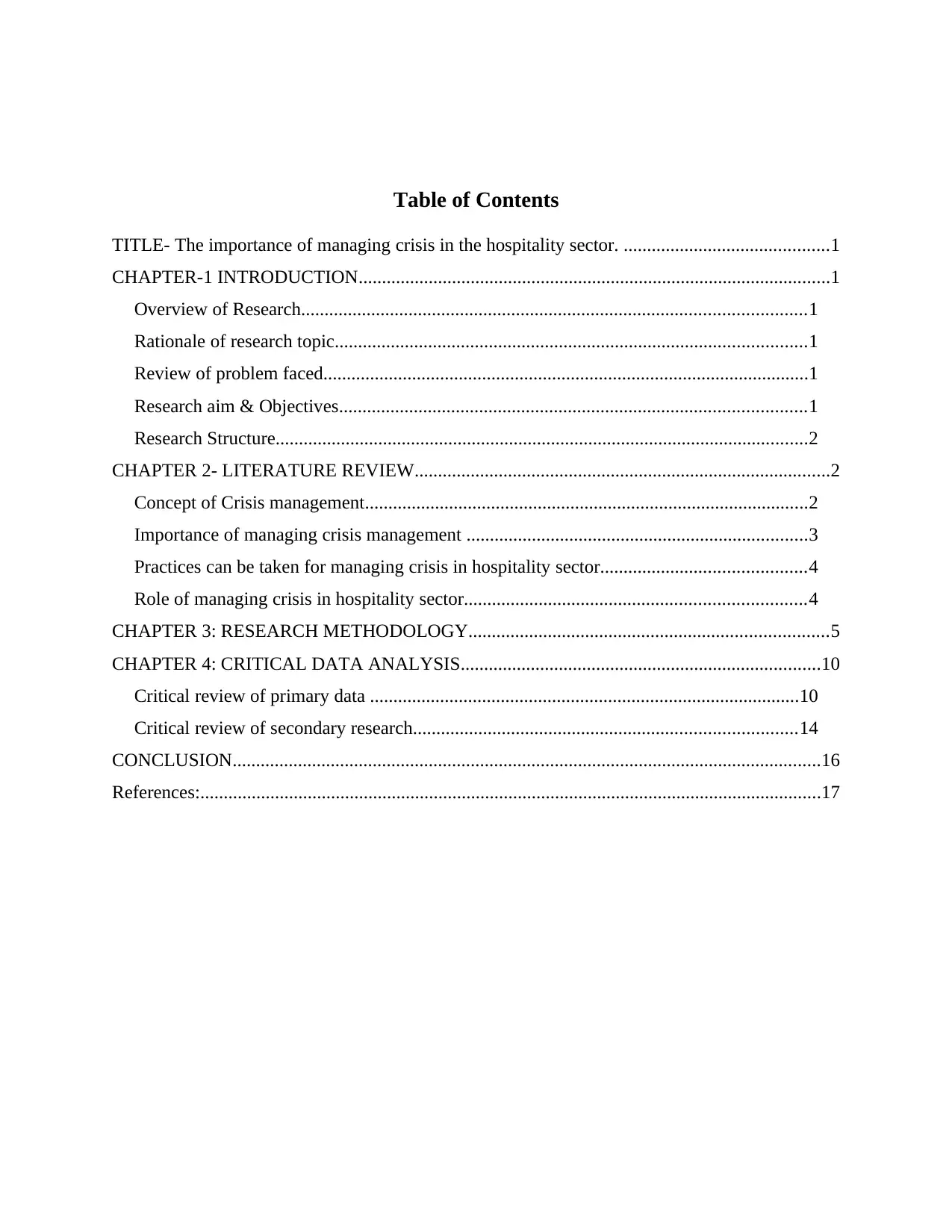
Table of Contents
TITLE- The importance of managing crisis in the hospitality sector. ............................................1
CHAPTER-1 INTRODUCTION.....................................................................................................1
Overview of Research............................................................................................................1
Rationale of research topic.....................................................................................................1
Review of problem faced........................................................................................................1
Research aim & Objectives....................................................................................................1
Research Structure..................................................................................................................2
CHAPTER 2- LITERATURE REVIEW.........................................................................................2
Concept of Crisis management...............................................................................................2
Importance of managing crisis management .........................................................................3
Practices can be taken for managing crisis in hospitality sector............................................4
Role of managing crisis in hospitality sector.........................................................................4
CHAPTER 3: RESEARCH METHODOLOGY.............................................................................5
CHAPTER 4: CRITICAL DATA ANALYSIS.............................................................................10
Critical review of primary data ............................................................................................10
Critical review of secondary research..................................................................................14
CONCLUSION..............................................................................................................................16
References:.....................................................................................................................................17
TITLE- The importance of managing crisis in the hospitality sector. ............................................1
CHAPTER-1 INTRODUCTION.....................................................................................................1
Overview of Research............................................................................................................1
Rationale of research topic.....................................................................................................1
Review of problem faced........................................................................................................1
Research aim & Objectives....................................................................................................1
Research Structure..................................................................................................................2
CHAPTER 2- LITERATURE REVIEW.........................................................................................2
Concept of Crisis management...............................................................................................2
Importance of managing crisis management .........................................................................3
Practices can be taken for managing crisis in hospitality sector............................................4
Role of managing crisis in hospitality sector.........................................................................4
CHAPTER 3: RESEARCH METHODOLOGY.............................................................................5
CHAPTER 4: CRITICAL DATA ANALYSIS.............................................................................10
Critical review of primary data ............................................................................................10
Critical review of secondary research..................................................................................14
CONCLUSION..............................................................................................................................16
References:.....................................................................................................................................17
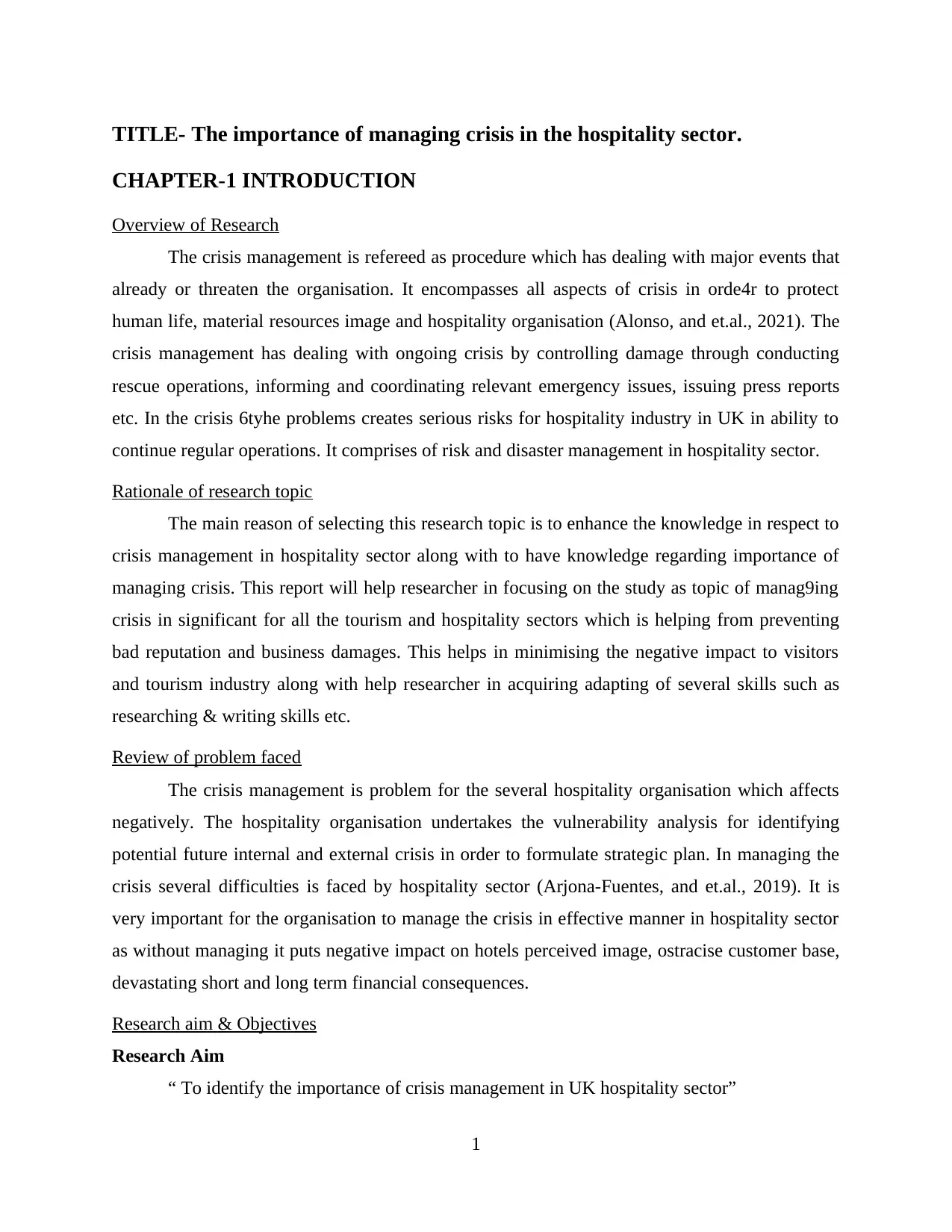
TITLE- The importance of managing crisis in the hospitality sector.
CHAPTER-1 INTRODUCTION
Overview of Research
The crisis management is refereed as procedure which has dealing with major events that
already or threaten the organisation. It encompasses all aspects of crisis in orde4r to protect
human life, material resources image and hospitality organisation (Alonso, and et.al., 2021). The
crisis management has dealing with ongoing crisis by controlling damage through conducting
rescue operations, informing and coordinating relevant emergency issues, issuing press reports
etc. In the crisis 6tyhe problems creates serious risks for hospitality industry in UK in ability to
continue regular operations. It comprises of risk and disaster management in hospitality sector.
Rationale of research topic
The main reason of selecting this research topic is to enhance the knowledge in respect to
crisis management in hospitality sector along with to have knowledge regarding importance of
managing crisis. This report will help researcher in focusing on the study as topic of manag9ing
crisis in significant for all the tourism and hospitality sectors which is helping from preventing
bad reputation and business damages. This helps in minimising the negative impact to visitors
and tourism industry along with help researcher in acquiring adapting of several skills such as
researching & writing skills etc.
Review of problem faced
The crisis management is problem for the several hospitality organisation which affects
negatively. The hospitality organisation undertakes the vulnerability analysis for identifying
potential future internal and external crisis in order to formulate strategic plan. In managing the
crisis several difficulties is faced by hospitality sector (Arjona-Fuentes, and et.al., 2019). It is
very important for the organisation to manage the crisis in effective manner in hospitality sector
as without managing it puts negative impact on hotels perceived image, ostracise customer base,
devastating short and long term financial consequences.
Research aim & Objectives
Research Aim
“ To identify the importance of crisis management in UK hospitality sector”
1
CHAPTER-1 INTRODUCTION
Overview of Research
The crisis management is refereed as procedure which has dealing with major events that
already or threaten the organisation. It encompasses all aspects of crisis in orde4r to protect
human life, material resources image and hospitality organisation (Alonso, and et.al., 2021). The
crisis management has dealing with ongoing crisis by controlling damage through conducting
rescue operations, informing and coordinating relevant emergency issues, issuing press reports
etc. In the crisis 6tyhe problems creates serious risks for hospitality industry in UK in ability to
continue regular operations. It comprises of risk and disaster management in hospitality sector.
Rationale of research topic
The main reason of selecting this research topic is to enhance the knowledge in respect to
crisis management in hospitality sector along with to have knowledge regarding importance of
managing crisis. This report will help researcher in focusing on the study as topic of manag9ing
crisis in significant for all the tourism and hospitality sectors which is helping from preventing
bad reputation and business damages. This helps in minimising the negative impact to visitors
and tourism industry along with help researcher in acquiring adapting of several skills such as
researching & writing skills etc.
Review of problem faced
The crisis management is problem for the several hospitality organisation which affects
negatively. The hospitality organisation undertakes the vulnerability analysis for identifying
potential future internal and external crisis in order to formulate strategic plan. In managing the
crisis several difficulties is faced by hospitality sector (Arjona-Fuentes, and et.al., 2019). It is
very important for the organisation to manage the crisis in effective manner in hospitality sector
as without managing it puts negative impact on hotels perceived image, ostracise customer base,
devastating short and long term financial consequences.
Research aim & Objectives
Research Aim
“ To identify the importance of crisis management in UK hospitality sector”
1
⊘ This is a preview!⊘
Do you want full access?
Subscribe today to unlock all pages.

Trusted by 1+ million students worldwide
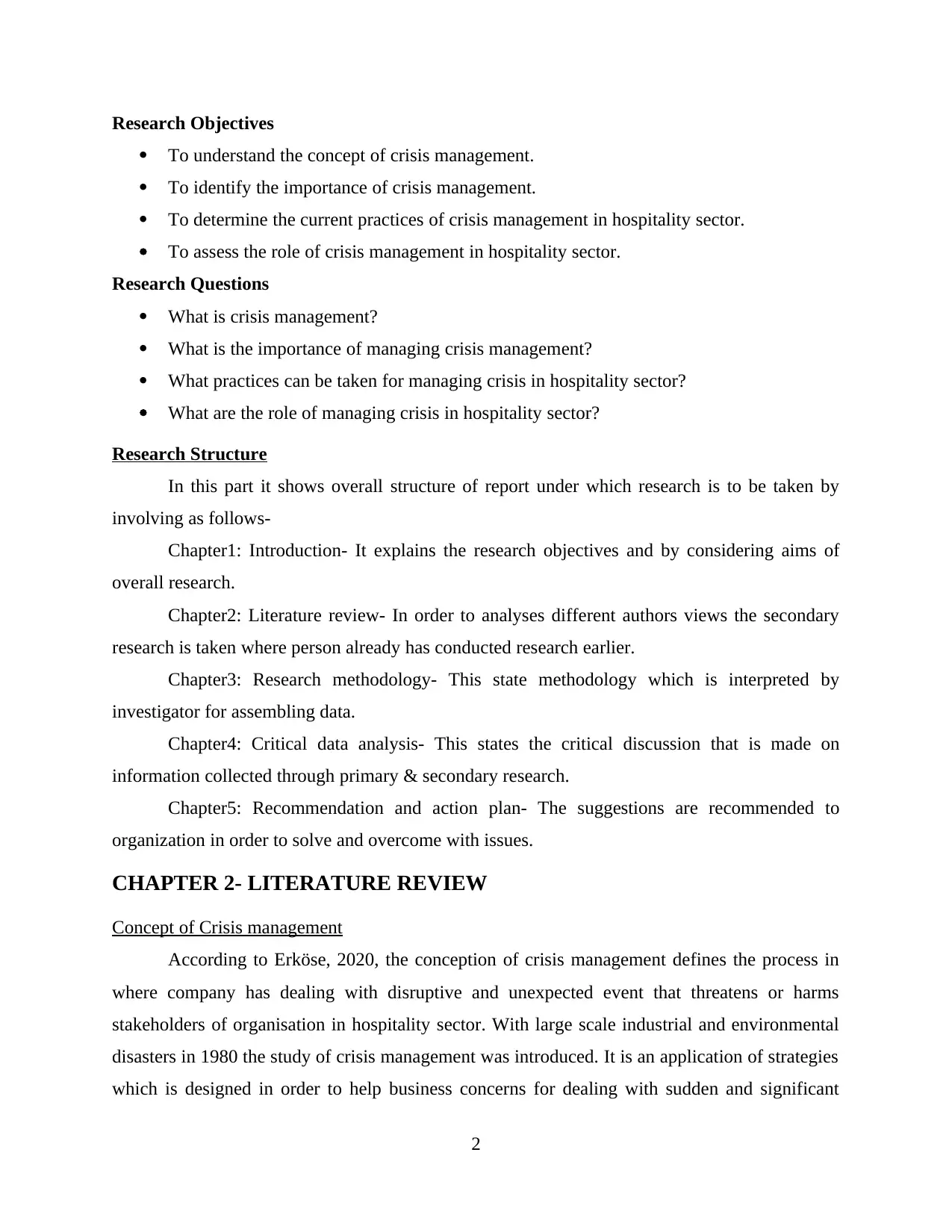
Research Objectives
To understand the concept of crisis management.
To identify the importance of crisis management.
To determine the current practices of crisis management in hospitality sector.
To assess the role of crisis management in hospitality sector.
Research Questions
What is crisis management?
What is the importance of managing crisis management?
What practices can be taken for managing crisis in hospitality sector?
What are the role of managing crisis in hospitality sector?
Research Structure
In this part it shows overall structure of report under which research is to be taken by
involving as follows-
Chapter1: Introduction- It explains the research objectives and by considering aims of
overall research.
Chapter2: Literature review- In order to analyses different authors views the secondary
research is taken where person already has conducted research earlier.
Chapter3: Research methodology- This state methodology which is interpreted by
investigator for assembling data.
Chapter4: Critical data analysis- This states the critical discussion that is made on
information collected through primary & secondary research.
Chapter5: Recommendation and action plan- The suggestions are recommended to
organization in order to solve and overcome with issues.
CHAPTER 2- LITERATURE REVIEW
Concept of Crisis management
According to Erköse, 2020, the conception of crisis management defines the process in
where company has dealing with disruptive and unexpected event that threatens or harms
stakeholders of organisation in hospitality sector. With large scale industrial and environmental
disasters in 1980 the study of crisis management was introduced. It is an application of strategies
which is designed in order to help business concerns for dealing with sudden and significant
2
To understand the concept of crisis management.
To identify the importance of crisis management.
To determine the current practices of crisis management in hospitality sector.
To assess the role of crisis management in hospitality sector.
Research Questions
What is crisis management?
What is the importance of managing crisis management?
What practices can be taken for managing crisis in hospitality sector?
What are the role of managing crisis in hospitality sector?
Research Structure
In this part it shows overall structure of report under which research is to be taken by
involving as follows-
Chapter1: Introduction- It explains the research objectives and by considering aims of
overall research.
Chapter2: Literature review- In order to analyses different authors views the secondary
research is taken where person already has conducted research earlier.
Chapter3: Research methodology- This state methodology which is interpreted by
investigator for assembling data.
Chapter4: Critical data analysis- This states the critical discussion that is made on
information collected through primary & secondary research.
Chapter5: Recommendation and action plan- The suggestions are recommended to
organization in order to solve and overcome with issues.
CHAPTER 2- LITERATURE REVIEW
Concept of Crisis management
According to Erköse, 2020, the conception of crisis management defines the process in
where company has dealing with disruptive and unexpected event that threatens or harms
stakeholders of organisation in hospitality sector. With large scale industrial and environmental
disasters in 1980 the study of crisis management was introduced. It is an application of strategies
which is designed in order to help business concerns for dealing with sudden and significant
2
Paraphrase This Document
Need a fresh take? Get an instant paraphrase of this document with our AI Paraphraser
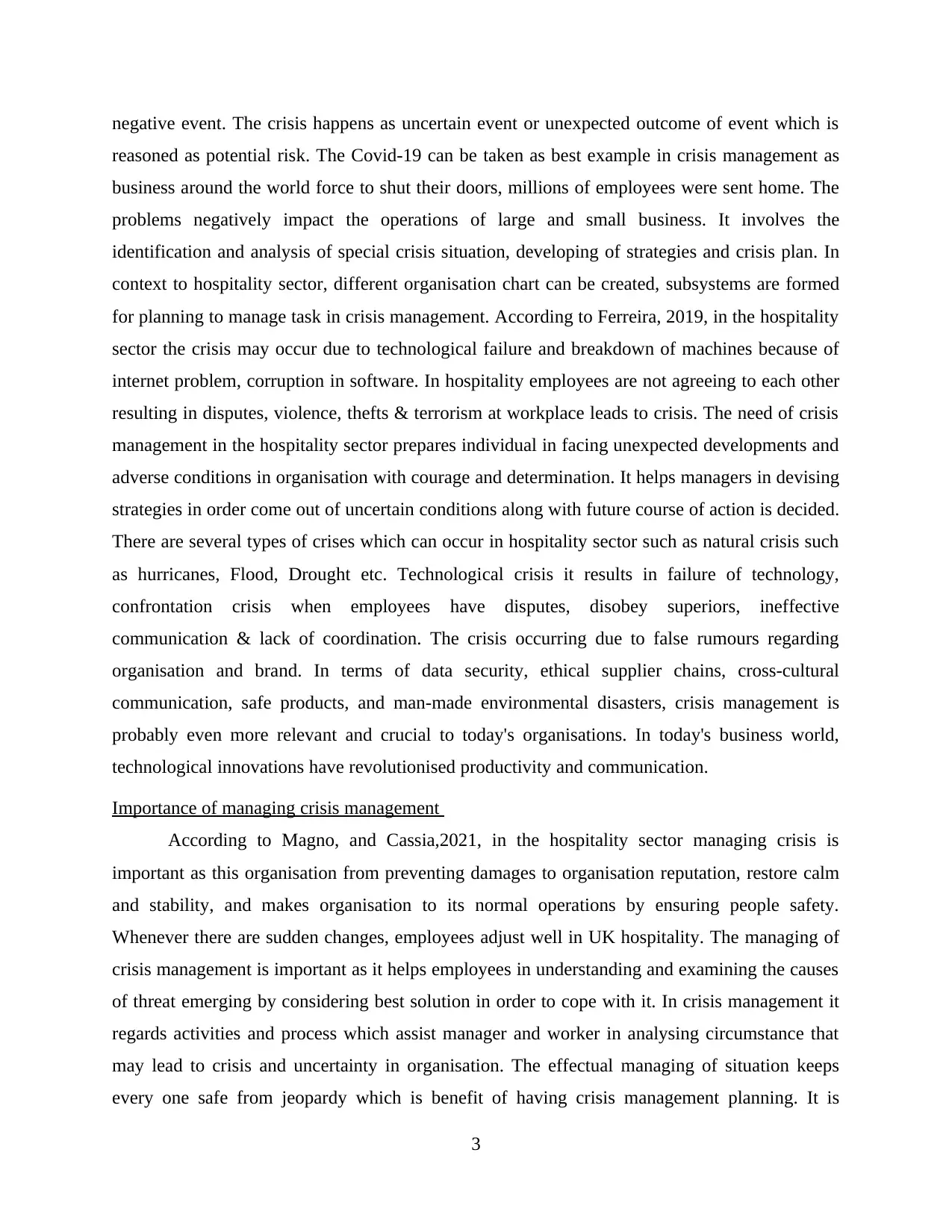
negative event. The crisis happens as uncertain event or unexpected outcome of event which is
reasoned as potential risk. The Covid-19 can be taken as best example in crisis management as
business around the world force to shut their doors, millions of employees were sent home. The
problems negatively impact the operations of large and small business. It involves the
identification and analysis of special crisis situation, developing of strategies and crisis plan. In
context to hospitality sector, different organisation chart can be created, subsystems are formed
for planning to manage task in crisis management. According to Ferreira, 2019, in the hospitality
sector the crisis may occur due to technological failure and breakdown of machines because of
internet problem, corruption in software. In hospitality employees are not agreeing to each other
resulting in disputes, violence, thefts & terrorism at workplace leads to crisis. The need of crisis
management in the hospitality sector prepares individual in facing unexpected developments and
adverse conditions in organisation with courage and determination. It helps managers in devising
strategies in order come out of uncertain conditions along with future course of action is decided.
There are several types of crises which can occur in hospitality sector such as natural crisis such
as hurricanes, Flood, Drought etc. Technological crisis it results in failure of technology,
confrontation crisis when employees have disputes, disobey superiors, ineffective
communication & lack of coordination. The crisis occurring due to false rumours regarding
organisation and brand. In terms of data security, ethical supplier chains, cross-cultural
communication, safe products, and man-made environmental disasters, crisis management is
probably even more relevant and crucial to today's organisations. In today's business world,
technological innovations have revolutionised productivity and communication.
Importance of managing crisis management
According to Magno, and Cassia,2021, in the hospitality sector managing crisis is
important as this organisation from preventing damages to organisation reputation, restore calm
and stability, and makes organisation to its normal operations by ensuring people safety.
Whenever there are sudden changes, employees adjust well in UK hospitality. The managing of
crisis management is important as it helps employees in understanding and examining the causes
of threat emerging by considering best solution in order to cope with it. In crisis management it
regards activities and process which assist manager and worker in analysing circumstance that
may lead to crisis and uncertainty in organisation. The effectual managing of situation keeps
every one safe from jeopardy which is benefit of having crisis management planning. It is
3
reasoned as potential risk. The Covid-19 can be taken as best example in crisis management as
business around the world force to shut their doors, millions of employees were sent home. The
problems negatively impact the operations of large and small business. It involves the
identification and analysis of special crisis situation, developing of strategies and crisis plan. In
context to hospitality sector, different organisation chart can be created, subsystems are formed
for planning to manage task in crisis management. According to Ferreira, 2019, in the hospitality
sector the crisis may occur due to technological failure and breakdown of machines because of
internet problem, corruption in software. In hospitality employees are not agreeing to each other
resulting in disputes, violence, thefts & terrorism at workplace leads to crisis. The need of crisis
management in the hospitality sector prepares individual in facing unexpected developments and
adverse conditions in organisation with courage and determination. It helps managers in devising
strategies in order come out of uncertain conditions along with future course of action is decided.
There are several types of crises which can occur in hospitality sector such as natural crisis such
as hurricanes, Flood, Drought etc. Technological crisis it results in failure of technology,
confrontation crisis when employees have disputes, disobey superiors, ineffective
communication & lack of coordination. The crisis occurring due to false rumours regarding
organisation and brand. In terms of data security, ethical supplier chains, cross-cultural
communication, safe products, and man-made environmental disasters, crisis management is
probably even more relevant and crucial to today's organisations. In today's business world,
technological innovations have revolutionised productivity and communication.
Importance of managing crisis management
According to Magno, and Cassia,2021, in the hospitality sector managing crisis is
important as this organisation from preventing damages to organisation reputation, restore calm
and stability, and makes organisation to its normal operations by ensuring people safety.
Whenever there are sudden changes, employees adjust well in UK hospitality. The managing of
crisis management is important as it helps employees in understanding and examining the causes
of threat emerging by considering best solution in order to cope with it. In crisis management it
regards activities and process which assist manager and worker in analysing circumstance that
may lead to crisis and uncertainty in organisation. The effectual managing of situation keeps
every one safe from jeopardy which is benefit of having crisis management planning. It is
3
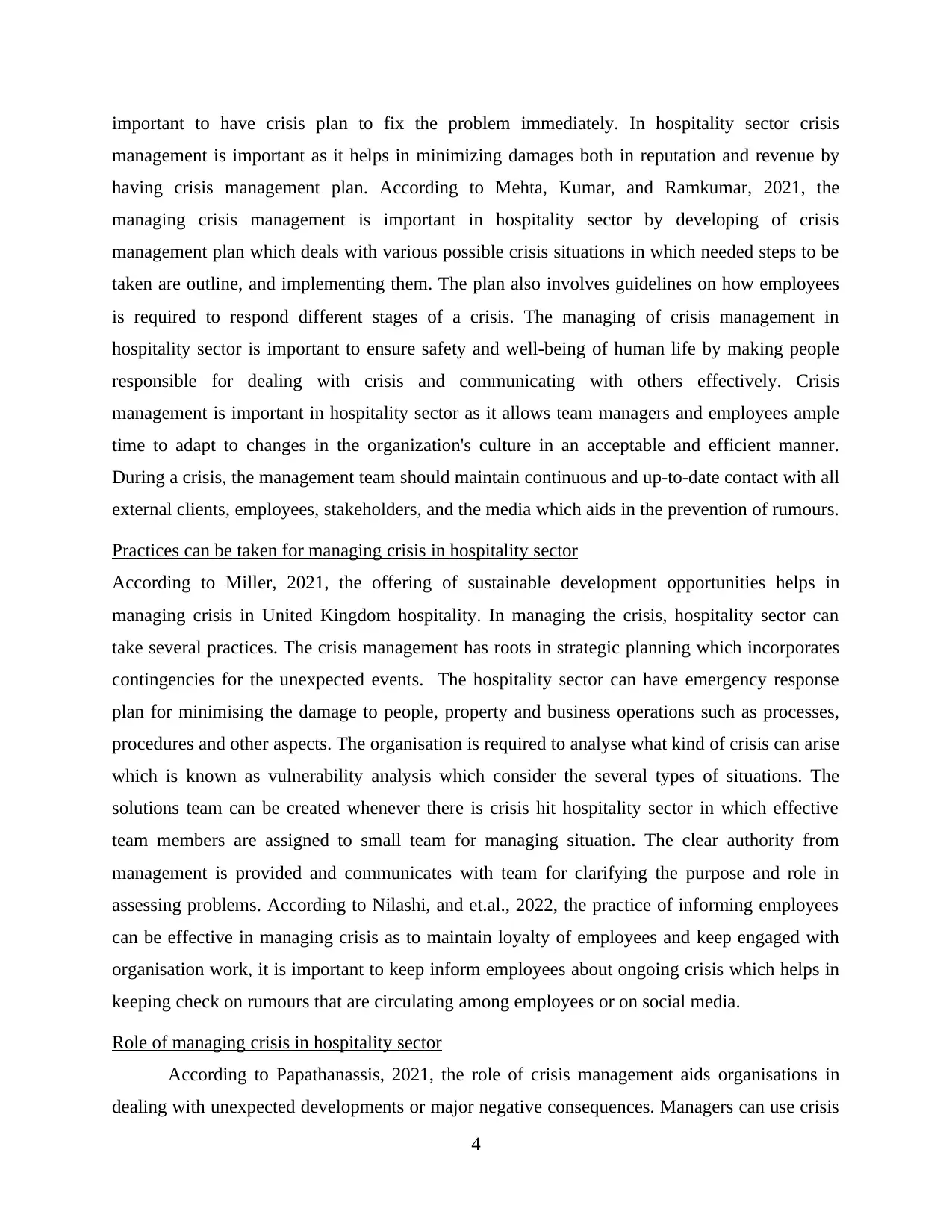
important to have crisis plan to fix the problem immediately. In hospitality sector crisis
management is important as it helps in minimizing damages both in reputation and revenue by
having crisis management plan. According to Mehta, Kumar, and Ramkumar, 2021, the
managing crisis management is important in hospitality sector by developing of crisis
management plan which deals with various possible crisis situations in which needed steps to be
taken are outline, and implementing them. The plan also involves guidelines on how employees
is required to respond different stages of a crisis. The managing of crisis management in
hospitality sector is important to ensure safety and well-being of human life by making people
responsible for dealing with crisis and communicating with others effectively. Crisis
management is important in hospitality sector as it allows team managers and employees ample
time to adapt to changes in the organization's culture in an acceptable and efficient manner.
During a crisis, the management team should maintain continuous and up-to-date contact with all
external clients, employees, stakeholders, and the media which aids in the prevention of rumours.
Practices can be taken for managing crisis in hospitality sector
According to Miller, 2021, the offering of sustainable development opportunities helps in
managing crisis in United Kingdom hospitality. In managing the crisis, hospitality sector can
take several practices. The crisis management has roots in strategic planning which incorporates
contingencies for the unexpected events. The hospitality sector can have emergency response
plan for minimising the damage to people, property and business operations such as processes,
procedures and other aspects. The organisation is required to analyse what kind of crisis can arise
which is known as vulnerability analysis which consider the several types of situations. The
solutions team can be created whenever there is crisis hit hospitality sector in which effective
team members are assigned to small team for managing situation. The clear authority from
management is provided and communicates with team for clarifying the purpose and role in
assessing problems. According to Nilashi, and et.al., 2022, the practice of informing employees
can be effective in managing crisis as to maintain loyalty of employees and keep engaged with
organisation work, it is important to keep inform employees about ongoing crisis which helps in
keeping check on rumours that are circulating among employees or on social media.
Role of managing crisis in hospitality sector
According to Papathanassis, 2021, the role of crisis management aids organisations in
dealing with unexpected developments or major negative consequences. Managers can use crisis
4
management is important as it helps in minimizing damages both in reputation and revenue by
having crisis management plan. According to Mehta, Kumar, and Ramkumar, 2021, the
managing crisis management is important in hospitality sector by developing of crisis
management plan which deals with various possible crisis situations in which needed steps to be
taken are outline, and implementing them. The plan also involves guidelines on how employees
is required to respond different stages of a crisis. The managing of crisis management in
hospitality sector is important to ensure safety and well-being of human life by making people
responsible for dealing with crisis and communicating with others effectively. Crisis
management is important in hospitality sector as it allows team managers and employees ample
time to adapt to changes in the organization's culture in an acceptable and efficient manner.
During a crisis, the management team should maintain continuous and up-to-date contact with all
external clients, employees, stakeholders, and the media which aids in the prevention of rumours.
Practices can be taken for managing crisis in hospitality sector
According to Miller, 2021, the offering of sustainable development opportunities helps in
managing crisis in United Kingdom hospitality. In managing the crisis, hospitality sector can
take several practices. The crisis management has roots in strategic planning which incorporates
contingencies for the unexpected events. The hospitality sector can have emergency response
plan for minimising the damage to people, property and business operations such as processes,
procedures and other aspects. The organisation is required to analyse what kind of crisis can arise
which is known as vulnerability analysis which consider the several types of situations. The
solutions team can be created whenever there is crisis hit hospitality sector in which effective
team members are assigned to small team for managing situation. The clear authority from
management is provided and communicates with team for clarifying the purpose and role in
assessing problems. According to Nilashi, and et.al., 2022, the practice of informing employees
can be effective in managing crisis as to maintain loyalty of employees and keep engaged with
organisation work, it is important to keep inform employees about ongoing crisis which helps in
keeping check on rumours that are circulating among employees or on social media.
Role of managing crisis in hospitality sector
According to Papathanassis, 2021, the role of crisis management aids organisations in
dealing with unexpected developments or major negative consequences. Managers can use crisis
4
⊘ This is a preview!⊘
Do you want full access?
Subscribe today to unlock all pages.

Trusted by 1+ million students worldwide
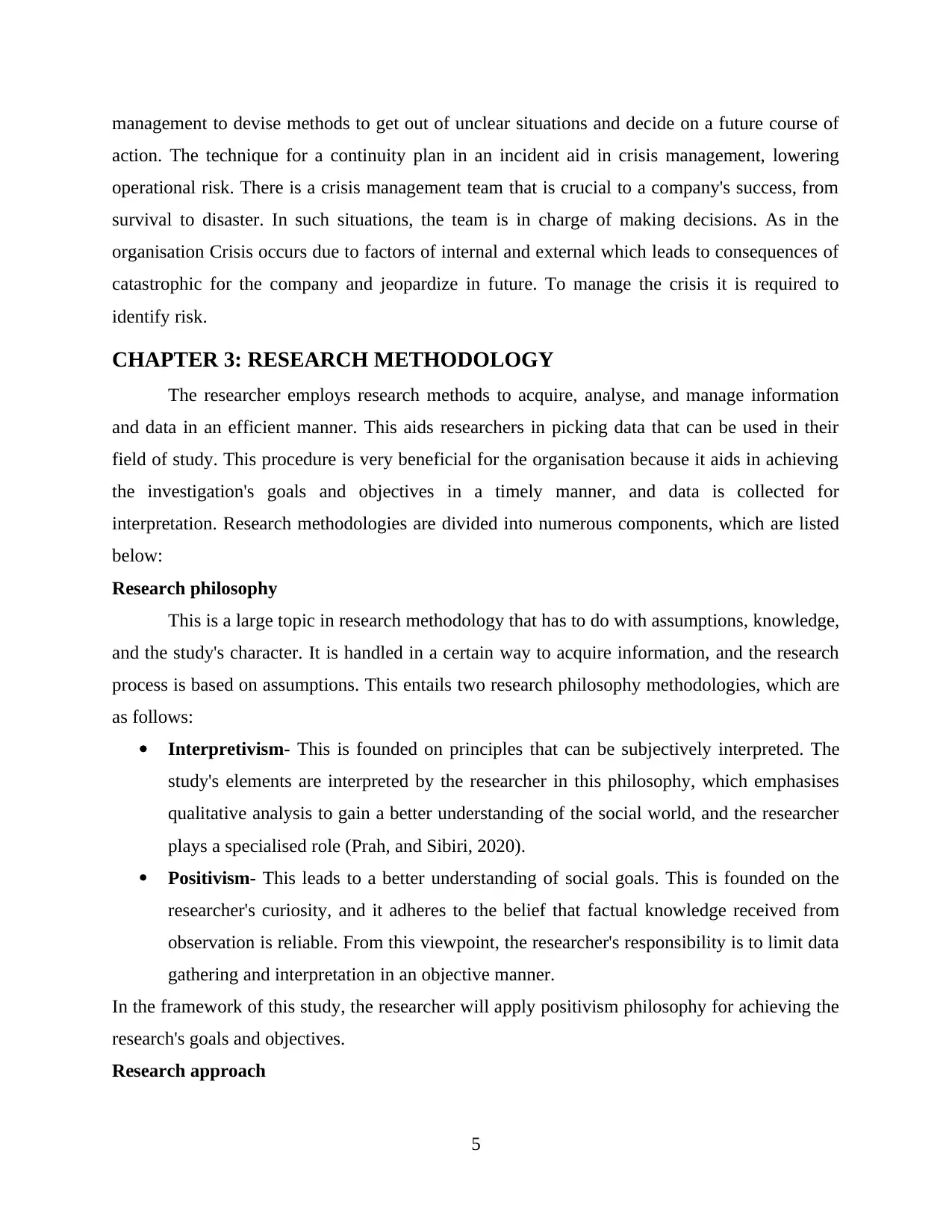
management to devise methods to get out of unclear situations and decide on a future course of
action. The technique for a continuity plan in an incident aid in crisis management, lowering
operational risk. There is a crisis management team that is crucial to a company's success, from
survival to disaster. In such situations, the team is in charge of making decisions. As in the
organisation Crisis occurs due to factors of internal and external which leads to consequences of
catastrophic for the company and jeopardize in future. To manage the crisis it is required to
identify risk.
CHAPTER 3: RESEARCH METHODOLOGY
The researcher employs research methods to acquire, analyse, and manage information
and data in an efficient manner. This aids researchers in picking data that can be used in their
field of study. This procedure is very beneficial for the organisation because it aids in achieving
the investigation's goals and objectives in a timely manner, and data is collected for
interpretation. Research methodologies are divided into numerous components, which are listed
below:
Research philosophy
This is a large topic in research methodology that has to do with assumptions, knowledge,
and the study's character. It is handled in a certain way to acquire information, and the research
process is based on assumptions. This entails two research philosophy methodologies, which are
as follows:
Interpretivism- This is founded on principles that can be subjectively interpreted. The
study's elements are interpreted by the researcher in this philosophy, which emphasises
qualitative analysis to gain a better understanding of the social world, and the researcher
plays a specialised role (Prah, and Sibiri, 2020).
Positivism- This leads to a better understanding of social goals. This is founded on the
researcher's curiosity, and it adheres to the belief that factual knowledge received from
observation is reliable. From this viewpoint, the researcher's responsibility is to limit data
gathering and interpretation in an objective manner.
In the framework of this study, the researcher will apply positivism philosophy for achieving the
research's goals and objectives.
Research approach
5
action. The technique for a continuity plan in an incident aid in crisis management, lowering
operational risk. There is a crisis management team that is crucial to a company's success, from
survival to disaster. In such situations, the team is in charge of making decisions. As in the
organisation Crisis occurs due to factors of internal and external which leads to consequences of
catastrophic for the company and jeopardize in future. To manage the crisis it is required to
identify risk.
CHAPTER 3: RESEARCH METHODOLOGY
The researcher employs research methods to acquire, analyse, and manage information
and data in an efficient manner. This aids researchers in picking data that can be used in their
field of study. This procedure is very beneficial for the organisation because it aids in achieving
the investigation's goals and objectives in a timely manner, and data is collected for
interpretation. Research methodologies are divided into numerous components, which are listed
below:
Research philosophy
This is a large topic in research methodology that has to do with assumptions, knowledge,
and the study's character. It is handled in a certain way to acquire information, and the research
process is based on assumptions. This entails two research philosophy methodologies, which are
as follows:
Interpretivism- This is founded on principles that can be subjectively interpreted. The
study's elements are interpreted by the researcher in this philosophy, which emphasises
qualitative analysis to gain a better understanding of the social world, and the researcher
plays a specialised role (Prah, and Sibiri, 2020).
Positivism- This leads to a better understanding of social goals. This is founded on the
researcher's curiosity, and it adheres to the belief that factual knowledge received from
observation is reliable. From this viewpoint, the researcher's responsibility is to limit data
gathering and interpretation in an objective manner.
In the framework of this study, the researcher will apply positivism philosophy for achieving the
research's goals and objectives.
Research approach
5
Paraphrase This Document
Need a fresh take? Get an instant paraphrase of this document with our AI Paraphraser
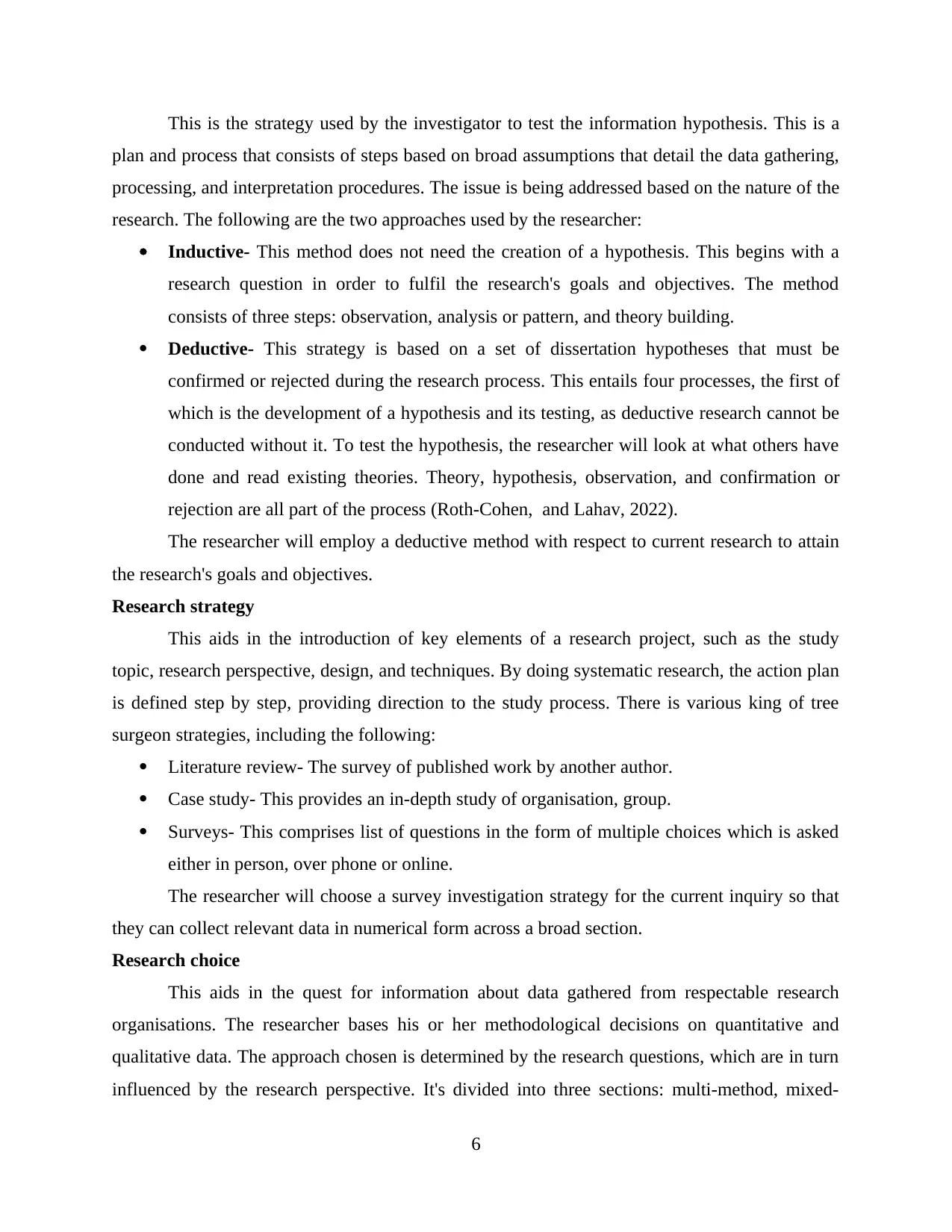
This is the strategy used by the investigator to test the information hypothesis. This is a
plan and process that consists of steps based on broad assumptions that detail the data gathering,
processing, and interpretation procedures. The issue is being addressed based on the nature of the
research. The following are the two approaches used by the researcher:
Inductive- This method does not need the creation of a hypothesis. This begins with a
research question in order to fulfil the research's goals and objectives. The method
consists of three steps: observation, analysis or pattern, and theory building.
Deductive- This strategy is based on a set of dissertation hypotheses that must be
confirmed or rejected during the research process. This entails four processes, the first of
which is the development of a hypothesis and its testing, as deductive research cannot be
conducted without it. To test the hypothesis, the researcher will look at what others have
done and read existing theories. Theory, hypothesis, observation, and confirmation or
rejection are all part of the process (Roth-Cohen, and Lahav, 2022).
The researcher will employ a deductive method with respect to current research to attain
the research's goals and objectives.
Research strategy
This aids in the introduction of key elements of a research project, such as the study
topic, research perspective, design, and techniques. By doing systematic research, the action plan
is defined step by step, providing direction to the study process. There is various king of tree
surgeon strategies, including the following:
Literature review- The survey of published work by another author.
Case study- This provides an in-depth study of organisation, group.
Surveys- This comprises list of questions in the form of multiple choices which is asked
either in person, over phone or online.
The researcher will choose a survey investigation strategy for the current inquiry so that
they can collect relevant data in numerical form across a broad section.
Research choice
This aids in the quest for information about data gathered from respectable research
organisations. The researcher bases his or her methodological decisions on quantitative and
qualitative data. The approach chosen is determined by the research questions, which are in turn
influenced by the research perspective. It's divided into three sections: multi-method, mixed-
6
plan and process that consists of steps based on broad assumptions that detail the data gathering,
processing, and interpretation procedures. The issue is being addressed based on the nature of the
research. The following are the two approaches used by the researcher:
Inductive- This method does not need the creation of a hypothesis. This begins with a
research question in order to fulfil the research's goals and objectives. The method
consists of three steps: observation, analysis or pattern, and theory building.
Deductive- This strategy is based on a set of dissertation hypotheses that must be
confirmed or rejected during the research process. This entails four processes, the first of
which is the development of a hypothesis and its testing, as deductive research cannot be
conducted without it. To test the hypothesis, the researcher will look at what others have
done and read existing theories. Theory, hypothesis, observation, and confirmation or
rejection are all part of the process (Roth-Cohen, and Lahav, 2022).
The researcher will employ a deductive method with respect to current research to attain
the research's goals and objectives.
Research strategy
This aids in the introduction of key elements of a research project, such as the study
topic, research perspective, design, and techniques. By doing systematic research, the action plan
is defined step by step, providing direction to the study process. There is various king of tree
surgeon strategies, including the following:
Literature review- The survey of published work by another author.
Case study- This provides an in-depth study of organisation, group.
Surveys- This comprises list of questions in the form of multiple choices which is asked
either in person, over phone or online.
The researcher will choose a survey investigation strategy for the current inquiry so that
they can collect relevant data in numerical form across a broad section.
Research choice
This aids in the quest for information about data gathered from respectable research
organisations. The researcher bases his or her methodological decisions on quantitative and
qualitative data. The approach chosen is determined by the research questions, which are in turn
influenced by the research perspective. It's divided into three sections: multi-method, mixed-
6
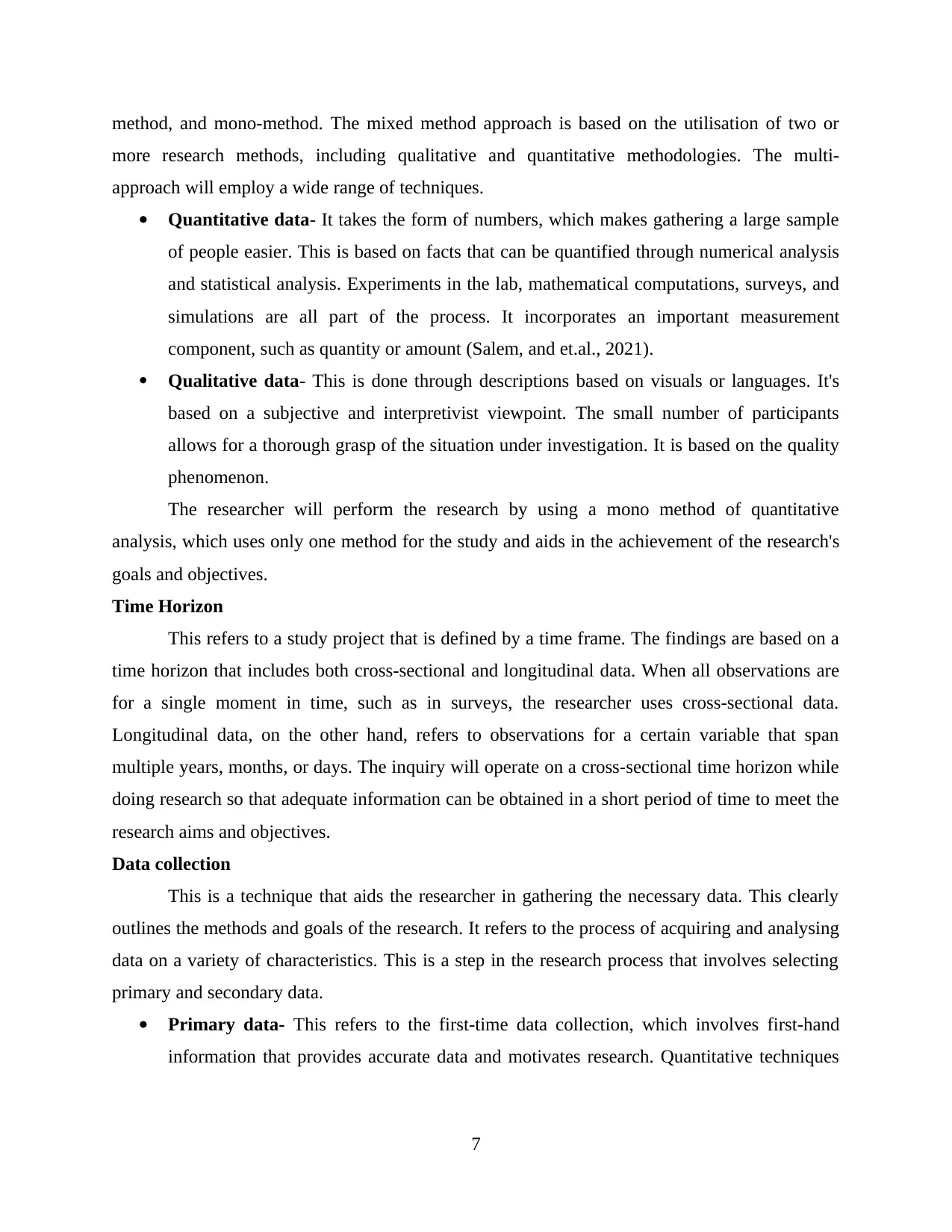
method, and mono-method. The mixed method approach is based on the utilisation of two or
more research methods, including qualitative and quantitative methodologies. The multi-
approach will employ a wide range of techniques.
Quantitative data- It takes the form of numbers, which makes gathering a large sample
of people easier. This is based on facts that can be quantified through numerical analysis
and statistical analysis. Experiments in the lab, mathematical computations, surveys, and
simulations are all part of the process. It incorporates an important measurement
component, such as quantity or amount (Salem, and et.al., 2021).
Qualitative data- This is done through descriptions based on visuals or languages. It's
based on a subjective and interpretivist viewpoint. The small number of participants
allows for a thorough grasp of the situation under investigation. It is based on the quality
phenomenon.
The researcher will perform the research by using a mono method of quantitative
analysis, which uses only one method for the study and aids in the achievement of the research's
goals and objectives.
Time Horizon
This refers to a study project that is defined by a time frame. The findings are based on a
time horizon that includes both cross-sectional and longitudinal data. When all observations are
for a single moment in time, such as in surveys, the researcher uses cross-sectional data.
Longitudinal data, on the other hand, refers to observations for a certain variable that span
multiple years, months, or days. The inquiry will operate on a cross-sectional time horizon while
doing research so that adequate information can be obtained in a short period of time to meet the
research aims and objectives.
Data collection
This is a technique that aids the researcher in gathering the necessary data. This clearly
outlines the methods and goals of the research. It refers to the process of acquiring and analysing
data on a variety of characteristics. This is a step in the research process that involves selecting
primary and secondary data.
Primary data- This refers to the first-time data collection, which involves first-hand
information that provides accurate data and motivates research. Quantitative techniques
7
more research methods, including qualitative and quantitative methodologies. The multi-
approach will employ a wide range of techniques.
Quantitative data- It takes the form of numbers, which makes gathering a large sample
of people easier. This is based on facts that can be quantified through numerical analysis
and statistical analysis. Experiments in the lab, mathematical computations, surveys, and
simulations are all part of the process. It incorporates an important measurement
component, such as quantity or amount (Salem, and et.al., 2021).
Qualitative data- This is done through descriptions based on visuals or languages. It's
based on a subjective and interpretivist viewpoint. The small number of participants
allows for a thorough grasp of the situation under investigation. It is based on the quality
phenomenon.
The researcher will perform the research by using a mono method of quantitative
analysis, which uses only one method for the study and aids in the achievement of the research's
goals and objectives.
Time Horizon
This refers to a study project that is defined by a time frame. The findings are based on a
time horizon that includes both cross-sectional and longitudinal data. When all observations are
for a single moment in time, such as in surveys, the researcher uses cross-sectional data.
Longitudinal data, on the other hand, refers to observations for a certain variable that span
multiple years, months, or days. The inquiry will operate on a cross-sectional time horizon while
doing research so that adequate information can be obtained in a short period of time to meet the
research aims and objectives.
Data collection
This is a technique that aids the researcher in gathering the necessary data. This clearly
outlines the methods and goals of the research. It refers to the process of acquiring and analysing
data on a variety of characteristics. This is a step in the research process that involves selecting
primary and secondary data.
Primary data- This refers to the first-time data collection, which involves first-hand
information that provides accurate data and motivates research. Quantitative techniques
7
⊘ This is a preview!⊘
Do you want full access?
Subscribe today to unlock all pages.

Trusted by 1+ million students worldwide
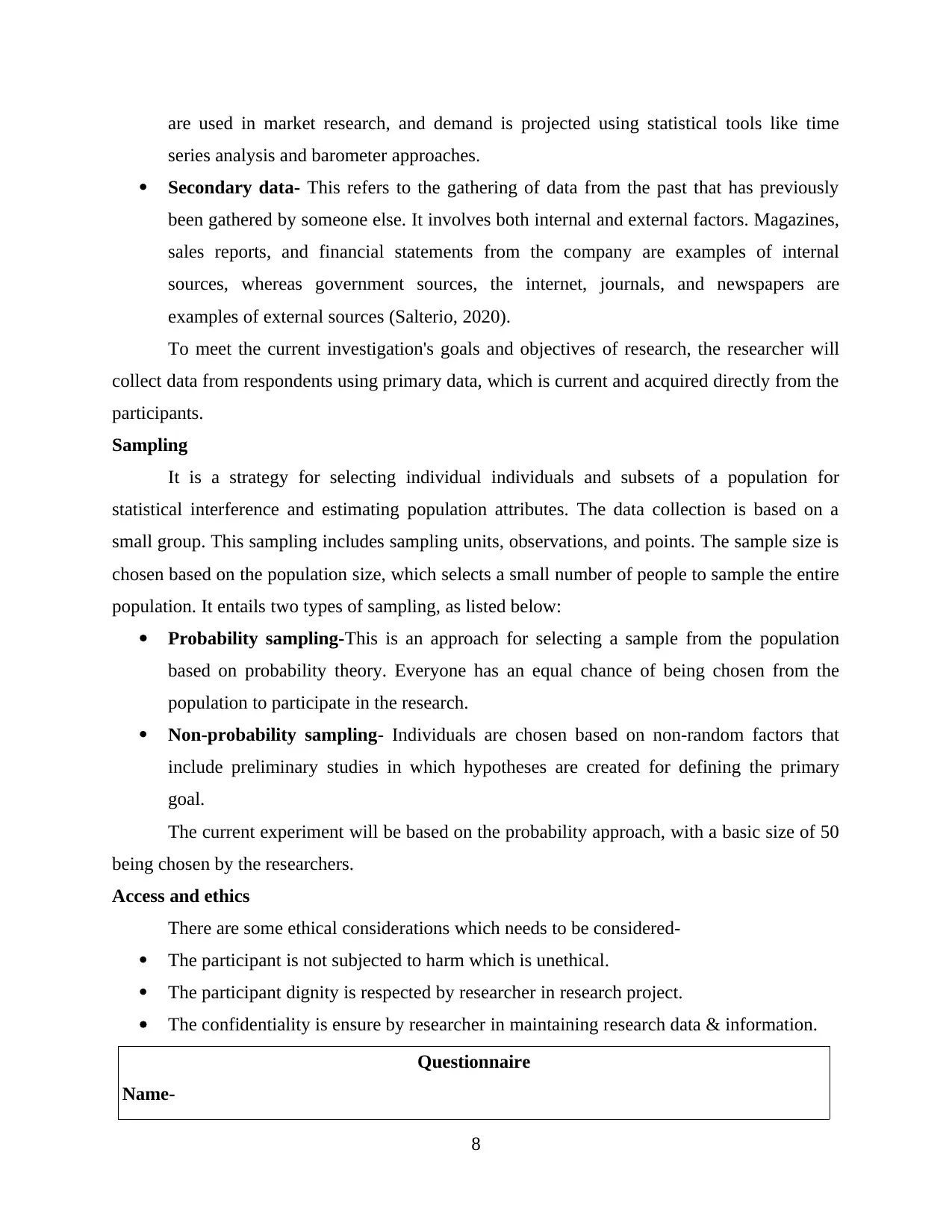
are used in market research, and demand is projected using statistical tools like time
series analysis and barometer approaches.
Secondary data- This refers to the gathering of data from the past that has previously
been gathered by someone else. It involves both internal and external factors. Magazines,
sales reports, and financial statements from the company are examples of internal
sources, whereas government sources, the internet, journals, and newspapers are
examples of external sources (Salterio, 2020).
To meet the current investigation's goals and objectives of research, the researcher will
collect data from respondents using primary data, which is current and acquired directly from the
participants.
Sampling
It is a strategy for selecting individual individuals and subsets of a population for
statistical interference and estimating population attributes. The data collection is based on a
small group. This sampling includes sampling units, observations, and points. The sample size is
chosen based on the population size, which selects a small number of people to sample the entire
population. It entails two types of sampling, as listed below:
Probability sampling-This is an approach for selecting a sample from the population
based on probability theory. Everyone has an equal chance of being chosen from the
population to participate in the research.
Non-probability sampling- Individuals are chosen based on non-random factors that
include preliminary studies in which hypotheses are created for defining the primary
goal.
The current experiment will be based on the probability approach, with a basic size of 50
being chosen by the researchers.
Access and ethics
There are some ethical considerations which needs to be considered-
The participant is not subjected to harm which is unethical.
The participant dignity is respected by researcher in research project.
The confidentiality is ensure by researcher in maintaining research data & information.
Questionnaire
Name-
8
series analysis and barometer approaches.
Secondary data- This refers to the gathering of data from the past that has previously
been gathered by someone else. It involves both internal and external factors. Magazines,
sales reports, and financial statements from the company are examples of internal
sources, whereas government sources, the internet, journals, and newspapers are
examples of external sources (Salterio, 2020).
To meet the current investigation's goals and objectives of research, the researcher will
collect data from respondents using primary data, which is current and acquired directly from the
participants.
Sampling
It is a strategy for selecting individual individuals and subsets of a population for
statistical interference and estimating population attributes. The data collection is based on a
small group. This sampling includes sampling units, observations, and points. The sample size is
chosen based on the population size, which selects a small number of people to sample the entire
population. It entails two types of sampling, as listed below:
Probability sampling-This is an approach for selecting a sample from the population
based on probability theory. Everyone has an equal chance of being chosen from the
population to participate in the research.
Non-probability sampling- Individuals are chosen based on non-random factors that
include preliminary studies in which hypotheses are created for defining the primary
goal.
The current experiment will be based on the probability approach, with a basic size of 50
being chosen by the researchers.
Access and ethics
There are some ethical considerations which needs to be considered-
The participant is not subjected to harm which is unethical.
The participant dignity is respected by researcher in research project.
The confidentiality is ensure by researcher in maintaining research data & information.
Questionnaire
Name-
8
Paraphrase This Document
Need a fresh take? Get an instant paraphrase of this document with our AI Paraphraser
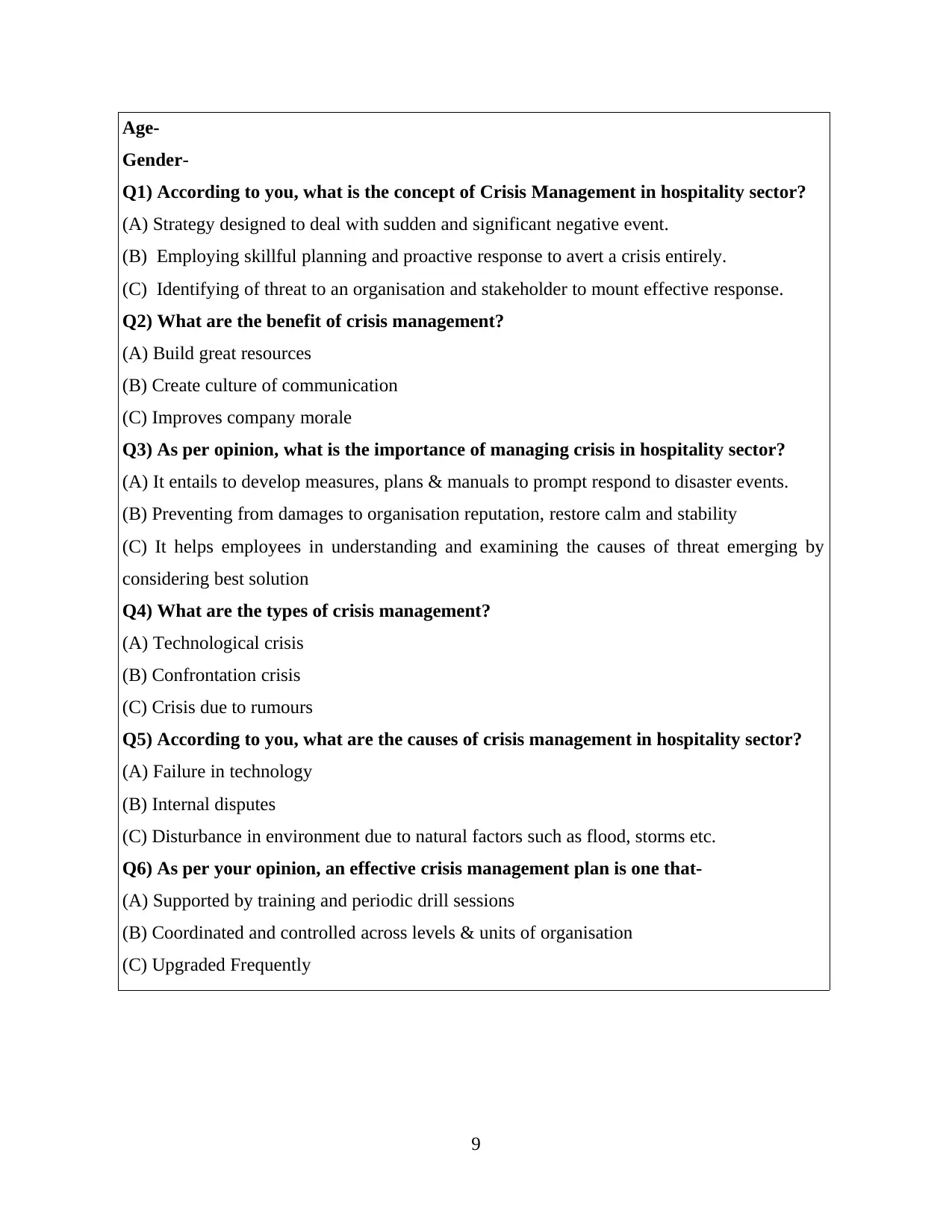
Age-
Gender-
Q1) According to you, what is the concept of Crisis Management in hospitality sector?
(A) Strategy designed to deal with sudden and significant negative event.
(B) Employing skillful planning and proactive response to avert a crisis entirely.
(C) Identifying of threat to an organisation and stakeholder to mount effective response.
Q2) What are the benefit of crisis management?
(A) Build great resources
(B) Create culture of communication
(C) Improves company morale
Q3) As per opinion, what is the importance of managing crisis in hospitality sector?
(A) It entails to develop measures, plans & manuals to prompt respond to disaster events.
(B) Preventing from damages to organisation reputation, restore calm and stability
(C) It helps employees in understanding and examining the causes of threat emerging by
considering best solution
Q4) What are the types of crisis management?
(A) Technological crisis
(B) Confrontation crisis
(C) Crisis due to rumours
Q5) According to you, what are the causes of crisis management in hospitality sector?
(A) Failure in technology
(B) Internal disputes
(C) Disturbance in environment due to natural factors such as flood, storms etc.
Q6) As per your opinion, an effective crisis management plan is one that-
(A) Supported by training and periodic drill sessions
(B) Coordinated and controlled across levels & units of organisation
(C) Upgraded Frequently
9
Gender-
Q1) According to you, what is the concept of Crisis Management in hospitality sector?
(A) Strategy designed to deal with sudden and significant negative event.
(B) Employing skillful planning and proactive response to avert a crisis entirely.
(C) Identifying of threat to an organisation and stakeholder to mount effective response.
Q2) What are the benefit of crisis management?
(A) Build great resources
(B) Create culture of communication
(C) Improves company morale
Q3) As per opinion, what is the importance of managing crisis in hospitality sector?
(A) It entails to develop measures, plans & manuals to prompt respond to disaster events.
(B) Preventing from damages to organisation reputation, restore calm and stability
(C) It helps employees in understanding and examining the causes of threat emerging by
considering best solution
Q4) What are the types of crisis management?
(A) Technological crisis
(B) Confrontation crisis
(C) Crisis due to rumours
Q5) According to you, what are the causes of crisis management in hospitality sector?
(A) Failure in technology
(B) Internal disputes
(C) Disturbance in environment due to natural factors such as flood, storms etc.
Q6) As per your opinion, an effective crisis management plan is one that-
(A) Supported by training and periodic drill sessions
(B) Coordinated and controlled across levels & units of organisation
(C) Upgraded Frequently
9
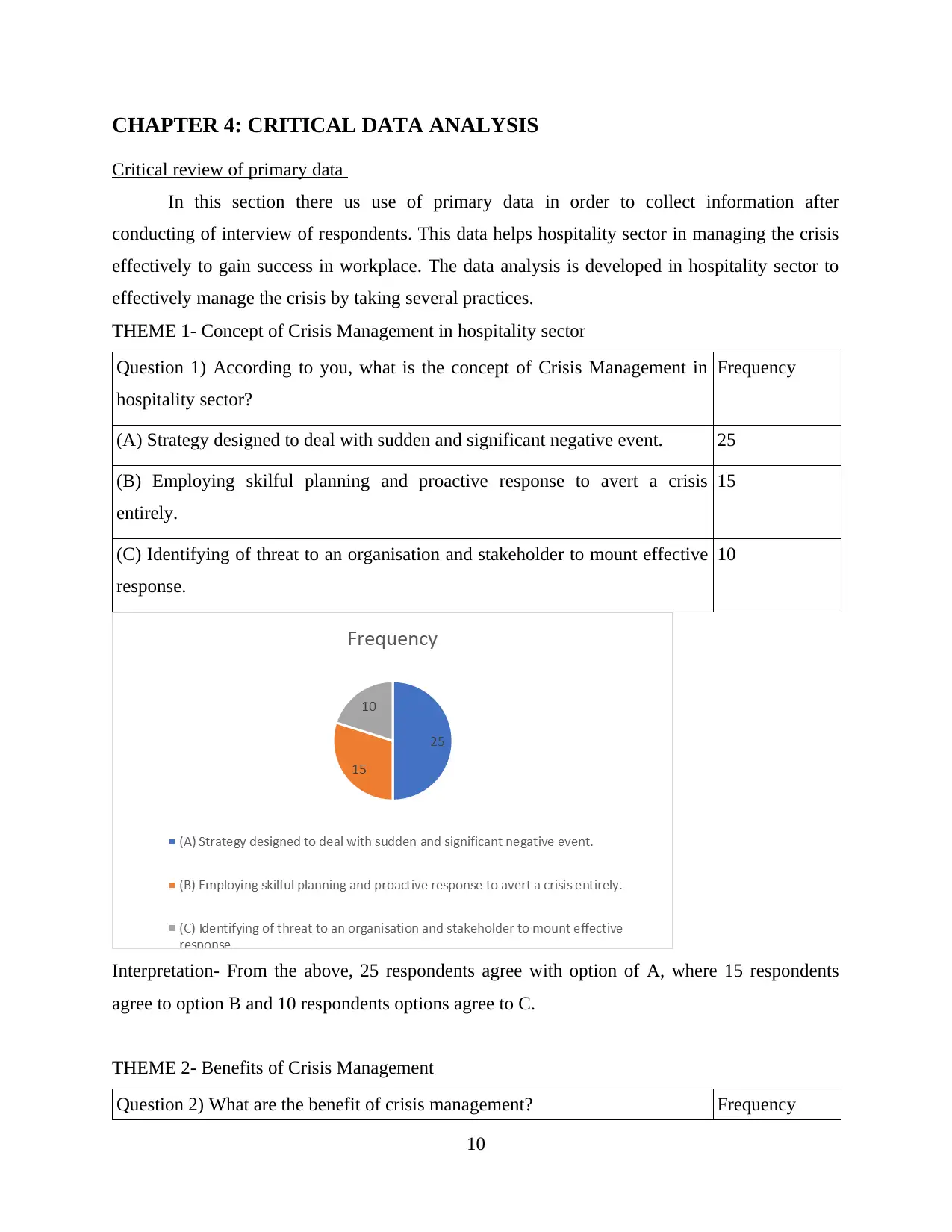
CHAPTER 4: CRITICAL DATA ANALYSIS
Critical review of primary data
In this section there us use of primary data in order to collect information after
conducting of interview of respondents. This data helps hospitality sector in managing the crisis
effectively to gain success in workplace. The data analysis is developed in hospitality sector to
effectively manage the crisis by taking several practices.
THEME 1- Concept of Crisis Management in hospitality sector
Question 1) According to you, what is the concept of Crisis Management in
hospitality sector?
Frequency
(A) Strategy designed to deal with sudden and significant negative event. 25
(B) Employing skilful planning and proactive response to avert a crisis
entirely.
15
(C) Identifying of threat to an organisation and stakeholder to mount effective
response.
10
Interpretation- From the above, 25 respondents agree with option of A, where 15 respondents
agree to option B and 10 respondents options agree to C.
THEME 2- Benefits of Crisis Management
Question 2) What are the benefit of crisis management? Frequency
10
Critical review of primary data
In this section there us use of primary data in order to collect information after
conducting of interview of respondents. This data helps hospitality sector in managing the crisis
effectively to gain success in workplace. The data analysis is developed in hospitality sector to
effectively manage the crisis by taking several practices.
THEME 1- Concept of Crisis Management in hospitality sector
Question 1) According to you, what is the concept of Crisis Management in
hospitality sector?
Frequency
(A) Strategy designed to deal with sudden and significant negative event. 25
(B) Employing skilful planning and proactive response to avert a crisis
entirely.
15
(C) Identifying of threat to an organisation and stakeholder to mount effective
response.
10
Interpretation- From the above, 25 respondents agree with option of A, where 15 respondents
agree to option B and 10 respondents options agree to C.
THEME 2- Benefits of Crisis Management
Question 2) What are the benefit of crisis management? Frequency
10
⊘ This is a preview!⊘
Do you want full access?
Subscribe today to unlock all pages.

Trusted by 1+ million students worldwide
1 out of 21
Related Documents
Your All-in-One AI-Powered Toolkit for Academic Success.
+13062052269
info@desklib.com
Available 24*7 on WhatsApp / Email
![[object Object]](/_next/static/media/star-bottom.7253800d.svg)
Unlock your academic potential
Copyright © 2020–2026 A2Z Services. All Rights Reserved. Developed and managed by ZUCOL.




